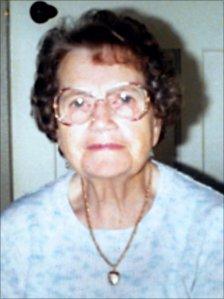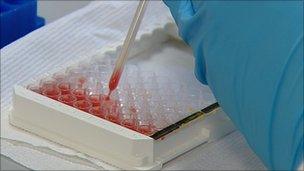Blood test expert: Tests not done properly
- Published

Mrs Hall was the only patient to have her blood tested when she fell ill
Ethel Hall was being treated for a broken hip at Leeds General Infirmary when she fell into a hypoglycaemic coma.
Hypoglycaemia - or low blood sugar - normally affects diabetics who have too much insulin or not enough food in their system. But Mrs Hall was not diabetic.
Medics took blood samples from the 86-year-old to try to find out what had caused her blood sugar to drop so low.
The test results seemed conclusive; Mrs Hall had massive amounts of insulin in her blood. And a low measurement of the hormone C-peptide indicated that it was pharmaceutical insulin, rather than that which is naturally produced in the body.
Mrs Hall died 21 days after falling into the coma, sparking a murder investigation.
Police trawled through patients notes and found four other cases where non-diabetic patients had experienced low blood sugar, and staff nurse Colin Norris was charged with four murders and an attempted murder.
He was 26 at the time and was working at both Leeds General Infirmary and St James' Hospital.
There was no direct evidence against the Scottish nurse; no witnesses or syringes found - but he was on shift during those five episodes and had said Mrs Hall "didn't look right" before she fell ill, which brought him to the attention of police.
The jury at Newcastle Crown Court were told that low blood sugar was so rare in non-diabetic patients that to have five cases over a six-month period must mean foul play.
The police could provide no motive but Colin Norris was convicted and jailed for 30 years.
Mrs Hall was the only patient of the five who, when she fell ill, was believed by medics to have been poisoned. The other three patients who died - Doris Ludlam, Bridget Bourke and Irene Crookes - all had natural causes recorded on their death certificates.
But now new evidence which features in a BBC documentary casts serious doubt on the evidence about the rarity of hypoglycaemic episodes among sick and elderly people, with some studies suggesting it can occur in up to 10% of patients.
Without blood samples from the other four patients, the only firm evidence that somebody was murdered lies with Mrs Hall's blood test.
But in fact, this key test - which measured high insulin and low C-peptide - was only carried out once.
Dr Adel Ismail, a retired consultant in clinical biochemistry and chemical endocrinology, has conducted research on this type of blood test - immunoassay - over the past 20 years.
He said when the stakes are so high the blood should have been tested twice for insulin.
"The laboratory results were the trigger for the police inquiry, so you can justifiably say that on the basis of these results, the management at Leeds General Infirmary were informed, the police was informed, and the whole thing start to snowball," he said.

Dr Ismail believes Mrs Hall's blood was not tested fully
"One additional sample taken a few hours earlier or later than the one, the single one, which is used, would have been immensely helpful, and it wasn't done, which is very unfortunate."
Dr Ismail, who gave evidence at Colin Norris's trial, said there could also be a natural reason for Mrs Hall's symptoms, which explain the blood test result.
He said: "My concern was we must exclude Insulin Autoimmune Hypoglycaemia, which is a natural pathology - rare - but remember doctors and nurses injecting insulin in patients is rare as well.
"So we're talking about distinguishing between two rare phenomena and it was important to exclude with confidence Insulin Autoimmune Hypoglycaemia in this case.
"Once you excluded this properly, then the diagnosis of surreptitious insulin becomes absolutely clear cut."
However, Dr Ismail is critical of how Mrs Hall's blood was tested for Insulin Autoimmune Syndrome, saying all possible antibody interferants had not been ruled out.
"Testing for antibodies which was supposed to be the absolute necessity, the hallmark, the footprint of the Insulin Autoimmune Syndrome, was not performed properly and therefore the diagnosis could not be excluded with the antibody, and that is a very important point."
Hospital Serial Killer: A Jury In The Dark will be broadcast on BBC1 Scotland on Tuesday 4 October, at 22:35 and on the iPlayer